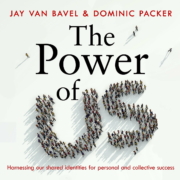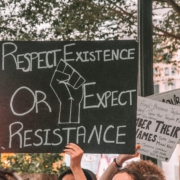In Confronting a Polarized Workforce, Persuasion Is Not the Goal. Learning Is!

In her new book I Never Thought of It That Way: How to Have Fearlessly Curious Conversations in Dangerously Divided Times, Mónica Guzmán outlines a recipe for disarming and transcending political polarization. A journalist, Guzmán draws from her experience working in communications for a nonprofit depolarization group called Braver Angels. “The book’s greatest offering, I think, is permission to reclaim people we might have dumped for ideological reasons,” a reviewer for The New York Times wrote. “Such connections won’t sully us but may in fact enrich us.”
That’s the conclusion psychologists came to after studying Braver Angels’ methods. For their workshops, the organization brings together self-identified liberals and conservatives and puts them through half a day to a day’s worth of exercises. “Their workshops are a mix of lots of tools that have been well studied and investigated by psychologists,” Julia Minson, a decision scientist at the Harvard Kennedy School of Government, told Ethical Systems. “But there was one piece that we thought was really novel. That was what they call creating persuasion-free zones.” It’s exactly how it sounds. The workshop is a space to try to understand the other side, and the nature of their beliefs and identity, and where they’re coming from. But not to persuade. Moderators enforce that strictly. “That’s a very specific thing that hasn’t been studied before,” Minson said.
Minson studied Braver Angels with Francesca Gino [Important context: this author has several publications retracted or under review], a psychologist at Harvard Business School, along with two of their students, Hannah Collins and Charlie Dorison. The researchers’ paper, “Underestimating counterparts’ learning goals impairs conflictual conversations,” will be published soon in Psychological Science. “We show,” Minson said, “that convincing people that their counterpart is willing to learn about them—which is what Braver Angels does, by putting that rule in place—leads to phenomenal outcomes in conflict as far as willingness to interact, and the attribution and inferences you make about your counterpart and the message they’re trying to communicate.”

Recently, Minson and Gino were moved by that research, along with the work of other scientists, to write a piece in Harvard Business Review explaining how to manage a polarized workforce. Ethical Systems caught up with the researchers over Zoom to chat about it.
What was the main, significant result of that research on Braver Angels?
Julia Minson: That people generally assume that those who disagree with them are not interested in learning about their point of view. That is interesting in and of itself. If you convince them that this person is, in fact, interested in learning about their point of view, it makes that person a more desirable and attractive interaction partner than somebody who agreed with you in the first place.
Opening up that relationship on its own provides some opening for future persuasion, I imagine.
Minson: Right. Although, the gospel that I keep preaching is that persuasion is not the goal.
Francesca Gino: Learning is!
Minson: There we go. Learning is the goal, right? And part of the reason is because persuasion is a zero-sum game. If I persuade you, you’re persuaded and I won and you lost. Whereas learning can be a massive win-win.
A survey you conducted last year found that conflict is an inescapable part of work life for employees at all levels. How would you define workplace conflict?
Minson: It’s useful to talk about conflict versus disagreement. We all know what disagreement means—I believe X and you believe Y. Where it gets interesting is when we start coming up with explanations for why we disagree. And those explanations end up being something like, “Well, it’s because you don’t know what you’re doing.” Or, “Because you haven’t tried hard enough to understand the situation.” Or, “Because you’re just seeing this through the lens of your own self interest. And that’s why you disagree with me.” As soon as you start making those kinds of attributions for disagreement, that’s when it becomes conflict.
How much of workplace conflict today, would you say, stems from strongly held political or ideological differences among employees?
Gino: What would you venture to say, Julia? I would say 70 percent.
Minson: I was going to say more than half. Part of what we think of issues that are explicitly political—the sort of politics that have been brought into the workplace—because they’re important, and they affect our identities, they affect how we want to do our work. An ideology could be, “The customer comes first.” Or, “We are here to build cutting edge technology.” Or, “This is a workplace where creativity can thrive.” Those are all ideologies that are not necessarily political ideologies, but are things that people in the workplace might feel very strongly about, that might come into direct conflict with what other people in the workplace feel strongly about. Add those two things together, you easily get to Francesca’s 70-plus percent.
Gino: I was thinking along the same lines. Ideas like, “We have always been a community.” Or, “We will always have that family feel.” That is causing, at the moment, lots of disagreements around how to think about the return to the office, whether to mandate it versus not. Especially at a time where for two years, people felt they didn’t quite have the control that they used to have, given the pandemic, I feel that people feel in control of their beliefs in a way that makes them, in a sense, less patient toward views that are different from their own. And opinions and preferences that were not evident are now more present. Like, are you a person who thinks that vaccines are good or bad? Are you a person who thinks the masks are good or bad? All of that is coming to the surface because people can’t hide their preferences based on what policies are put out by organizations.
Why do you say it’s bad advice to tell people to check their egos if they want to avoid escalating workplace conflict?
Minson: Giving people that advice to check their egos comes from a specific theory about where conflict comes from. And there’s sort of this very popular set of beliefs that to some extent, came from academic psychology, but has really been picked up by pop psychology, that when people disagree with you, and they refuse to change their mind, it’s because they’re being defensive. It’s because their ego is overinflated, yet fragile. And so they just can’t admit to the fact that they’re wrong about this, because if they admit it, it is threatening, in some sense, to their core idea of who they are. If you say, “Well, this is not about ego, put away your ego,” then that will fix this problem. I think the root cause of the problem has nothing to do with ego.
What is the root cause of people struggling to productively disagree?
Minson: The root cause of the problem has to do with the fact that people spend years and decades forming their beliefs and crystallizing and articulating their values. Part of that process is collecting more and more evidence and surrounding yourself with other people that support your values and beliefs. By the time you’re a grown up professional, you have a lot of evidence for why you are right, and people who disagree with you are wrong. And so it’s not about feeling threatened. It’s about the fact that you have information to support what you believe. When somebody says, “Well, it’s just your big ego, and you need to become less defensive.” It sounds incredibly condescending when you say, “Well, it’s not about my defensiveness. It’s about the fact that I have the truth. Here’s all the evidence for my truth, and you’re an idiot.” That’s why I think that advice is bad, because it stems from an inaccurate account of the psychology of conflict.
You write that people on both sides of a disagreement may be equally well informed, but with different information. Can you think of an example where that might be true?
Gino: Yes. There’s this discussion with an executive I have been close to for years, about how to deal with a difficult colleague—a person who is brilliant in his creativity but not always the best in welcoming ideas from others. I worked with that colleague closely for six months talking through his strengths and opportunities for improvement, so I have a perspective on how the executive could address the situation that is informed by that. He doesn’t. He has the perspective of thinking about his experience working with cases like this one in his long career. And so you end up disagreeing. And in fact, even in a context where what we want is the same thing: We want the colleague to be at his best when working with others, but we’re just looking at different pieces of information. But we feel quite strongly about what we know. And we disagree. There are lots of situations like this one. Often it’s very ambiguous or unclear what it is that you know that is leading you to have this understanding and what information I am looking at that is leading to this understanding.
Minson: I would say another example that often comes up in these conversations is climate-change policy. If you talk to people who are very concerned with climate change, they are 100 percent confident they’re 100 percent right because of the facts and the science. If you put them in a room with somebody who has grown up in coal country, that person is informed by a different set of facts—not a set of facts about climate change not being man made, but a set of facts about people losing their jobs and livelihood. And people in their 50s not wanting to be retrained for the new tech jobs of the future. It’s not that they might say, “Well, no, I’m a climate scientist, too. And I disagree with your account of climate change.” But they will say, “My lived experience is more relevant for how we should be handling this right now than your abstract climate facts that may or may not affect some people far away from me 30 years from now.” That lived experience and the science are both true. And they have different implications, depending on which one you prioritize.
Gino: There are a lot of workplace conflicts of that nature, especially across the status, or power, or different levels of the organization, where the leaders are saying, “Here’s the evidence that we’re looking at.” And people on the other side are saying, “But our experience feels different.”
What if both sides have perfectly matching information?
Minson: Even if the information is perfectly matching, the emphasis you put on which information can be more important and more relevant, and should be acted on, might still different. So when we talk about climate policy, we’ll say, “Well, this person just doesn’t get it. They didn’t read the science.” For all we know, they read the science, but they’re prioritizing things differently than somebody else who is prioritizing the science, or the long-term versus the short term.
Why do we have a tendency to unfairly caricature the views people have that oppose our own?
Gino: That makes us feel good about ourselves.
Minson: I think it’s because it’s easier. When people do things that seem self-serving, are they doing it in order to make themselves feel good? Or are they doing it because it saves cognitive processing? You disagree with me, I need to know what the cause of the disagreement is, in order to figure out how to move forward. Given that my beliefs and reasoning are easily available to me, and your beliefs and reasoning are opaque because I don’t have direct access to them, it’s very easy to say you don’t have any good reasons. And if you don’t have any good reasons, and you’re still claiming this nonsense, it’s because you’re a bad, lazy person. It’s a mix of, “I need to solve this problem of why we disagree,” and the easiest solution is that I’m right, and you’re wrong. Other solutions take a lot more thinking.
Gino: People are not willing to put in the effort, especially in situations where they might discover something that doesn’t make them look good, or that might make them realize that they might be wrong, or not completely precise.
Subscribe to the Ethical Systems newsletter
Aren’t we saving our egos if that’s the reason we make other people’s views out to be more extreme than they might be?
Gino: One of the pieces of research that Julia’s done, which I love, is showing that people have mispredictions about how unpleasant disagreement or conflict is going to be. It’s bad, but it’s not as bad as you think. It’s not necessarily ego, but just about protecting the feelings that we experience. We would rather have positive than unpleasant ones.
Minson: Yes. Quite often in the workplace, finding out that you are wrong has very tangible implications to your career and your compensation, or in the very least, just having to do more work.
What can you say to someone to get them to be less afraid about disagreeing with people at work?
Minson: It is not as bad as we expect it to be. When you say “workplace conflict,” what comes to mind is the worst fight you’ve ever gotten into. On average, disagreements at work are not that bad. We put too much emphasis on that one time that turned into a screaming match. Just recognizing that it’s unlikely to be as bad is important, and also going about it in a way that’s more productive. Training people to be better at these conversations can go a long way toward making them less avoidant, if you have the tools.
Sometimes I think what people worry about with workplace disagreement is not so much the disagreement itself, but the sour relationship it can create where, now, you are awkward with each other, more tentative to say things, because there’s that tension there that you don’t know what to do with.
Gino: There is some research in service management that shows that you feel better about the service provider if, somehow, they failed you—they didn’t provide the service that they said they would—but recover beautifully, than you do in the case in which they didn’t create the problem in the first place. I often think of conflict as similar if your approach conflicts with the receptiveness and the willingness to learn and to give the other person the opportunity to learn from you.
I feel that the way you live the conflict, after having had a disagreement, will have you actually feeling quite good about the person that you were talking to, more so than if you decided to avoid the disagreement altogether. Because there is a choice of avoiding something that you believe is bad. When you compare that, it may lead to regret or some rumination that you don’t even have the type of relationship that allows for disagreements to come to the surface. You feel much better about the relationship when you bring receptivity, and you work through your disagreements. But I don’t think that this has been empirically proven quite yet.
Can studying the emotional experience of disagreement show us better ways of arguing?
Gino: I think so. A lot of what the potential for receptiveness is about is trying to build the muscle that moves you away from having this instant, instinctual reaction of going into defense mode when you hear that somebody has different opinions, and wanting to defend your point of view—to one where you’re truly learning about the other side. Where you are showing, in essence, a little bit more uncertainty about your position to cause dialogue, rather than a back and forth that very much looks like a fight. The more people engage and use this muscle, the more there is the potential for contagion: I show receptiveness, you become more receptive yourself.
Why does showing receptiveness improve a disagreement?
Gino: What you’re doing is changing the emotional nature of the interaction, because part of being receptive means showing appreciation for the existence of another perspective. You’re not agreeing with it, but you’re showing appreciation. You’re removing that sense of tightening up, and feeling anger or dissatisfaction, and bringing more positive emotions around gratitude or understanding that otherwise are not often part conflict.
Can you learn to become more open-minded? Or is it more of a stable personality trait?
Minson: I hope to God you can learn. Otherwise, we’re all in trouble.
Gino: I can say—my husband might disagree—but at least I pause. I’m much more reflective on how I enter disagreements. There are times where I feel like, “Today I’m exhausted, I’m feeling tired.” I go to my husband and say, “I don’t think it’s a good idea to have this conversation right now.” Because I know that I would feel the urge of fighting the issue or trying to convince him that I’m right and that he’s wrong. I think that came from doing the research, and being convinced by the data, and recognizing that bringing learning into disagreement is a helpful approach to life. But it does take effort. I think I’m going to feel satisfied once—at every moment where I feel challenged on my position or my thinking—I have this more welcoming, receptive approach to the opinions or work of others.
How should we speak to others to signal that we are willing to be open-minded? You say you used natural language algorithms to help figure this out.
Minson: The algorithm spits out 36 different cues to receptiveness. What we’ve done is take those 36 and boil them down to four. They conveniently make a nice acronym: I HEAR you. H is for hedging. Things like, “Some people might say…” Or, “Occasionally bla, bla, bla…” The E stands for emphasizing agreement. Even if we strongly disagree, for example, about vaccine mandates, we might say, “Look, we both agree that we want this pandemic to end as soon as possible.” Or, “I agree with you that it’s been a really difficult two years.” The A stands for acknowledgment—so using your own words and your own airtime to repeat what the other person said, to show that you really heard it. So, “You seem to believe that it’s very important that…” I’m showing with my words that I heard you. R stands for reframing to the positive. You can say exactly the same message using positive language instead of negative language. Instead of, “I just hate it when people interrupt me,” you say, “I really appreciate it when people let me finish.”
Should leaders worry that if they come off as open minded, they won’t be seen as firm and confident in their beliefs and decision making?
Gino: Julia, you take this one since we debated it!
Minson: They should not worry. I have the data. It’s great when you can solve debates with data. The thing that makes people nervous about receptiveness is that it can sound like you’re conceding to somebody else’s point of view, or like you’re giving them a platform for perpetuating their crazy beliefs. The thing that conversational receptiveness really brings to the table is the ability to say your piece. But in a way that acknowledges and recognizes the other perspective. What we often do when we train people to communicate in a more receptive manner is say, “It doesn’t mean you’re not being persuasive. It doesn’t mean that you’re compromising. It just means that you’re stating your views in a way that also invites the other side into the conversation.” What we found in our experiments is that manner of communicating is actually seen as better leadership, than just going straight with argumentation.
How can companies foster a workplace culture that incentivizes people to adopt a more receptive mindset?
Gino: The one thing that I would recommend leaders to do is to model the behavior themselves. There is so much power in that. And in fact, especially when leaders are trying to create cultures that are more receptive, if people see that, at the top, that is not done, it is not a good signal to send. I would make sure that these are the types of behaviors that get rewarded. And so at the time of performance reviews, rather than just looking at objective measures of performance, let’s look at how people are working with others in tough moments. That is one thing that gets noted. Maybe more easily, knowing that our human nature gets in the way, I would make sure that people get trained on these types of skills. We require some rewiring in how we do things, so I would make the investment of allowing people to practice and be trained on these various skills.
Minson: The question of incentives is very interesting. One of the things that Fran’s answer, in particular about performance reviews, made me think about is that, quite often, what we evaluate people on is what they do. What we’re measuring affects behavior. Quite often performance evaluations include measures that are not conducive to an open, thoughtful discussion of opposing views. People are evaluated on being good team players or being collaborative, and all of those things are easily accomplished by just sweeping things under the rug. Imagine we evaluated people on thoughtfully confronting opposing views. That’s different from saying you’re collaborative, right? So if we care about a characteristic that we want our employees to take on, then let’s figure out what that looks like, and evaluate them on that instead of some other vague thing that’s not really the right thing.
Brian Gallagher is the communications director at Ethical Systems. Follow him on Twitter @bsgallagher.









